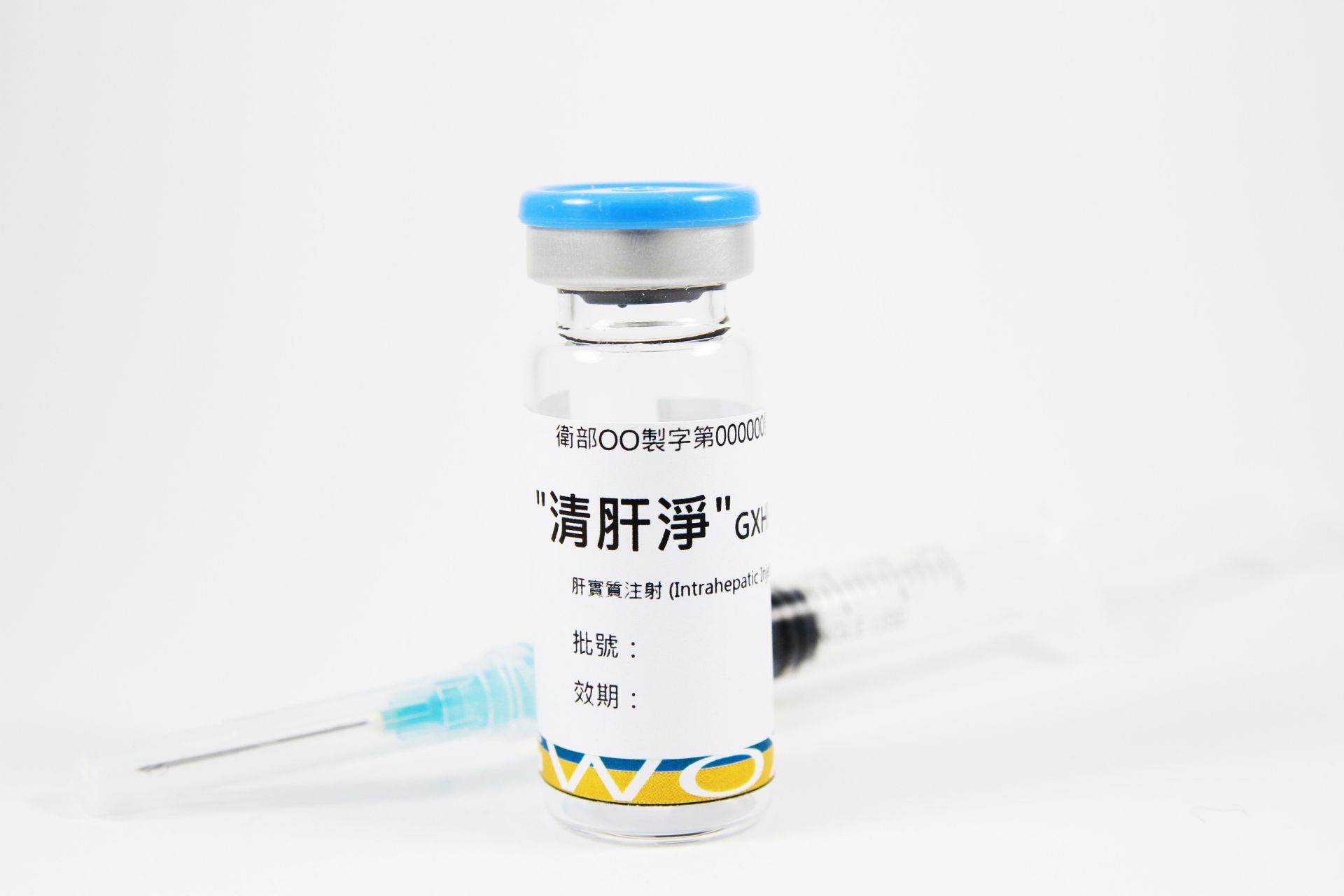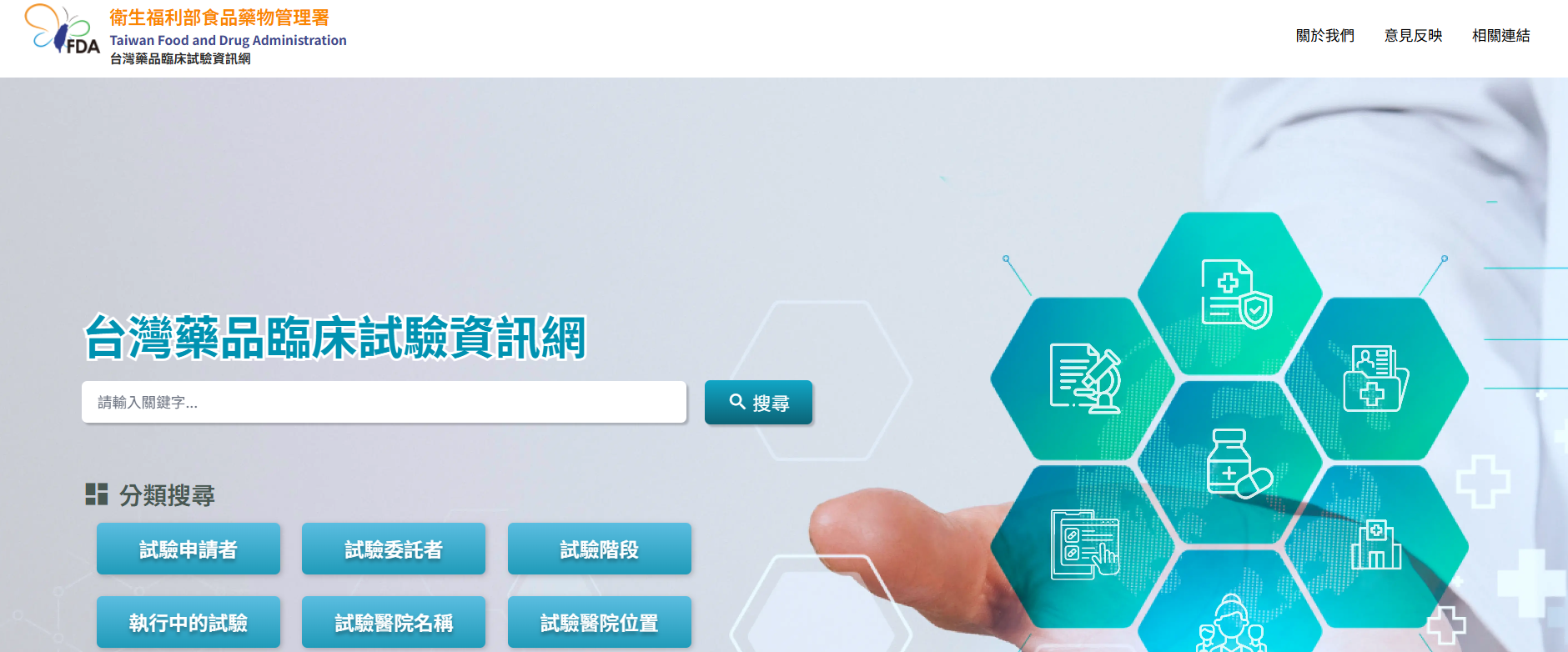GXHPC1® (Liver Cirrhosis)
-
Product
-
Preclinical
-
Phase I
-
Phase II
-
Phase III
-
NDA
-
Marketed
Introduction
IntroductionGXHPC1® is a novel, first-in-class autologous adipose-derived stem cell therapy developed for the treatment of liver cirrhosis. Pre-clinical research has demonstrated that GXHPC1® can ameliorate hepatic inflammation and reverse liver fibrosis.
In a phase I clinical trial, GXHPC1® through intrahepatic injection (IH) was shown to be safe, with no significant safety issues reported. The results demonstrated that GXHPC1® showed a tendency for improvement of liver function, METAVIR score, Child–Pugh score, MELD score, and quality of life for patients with liver cirrhosis, suggesting its potential as a treatment for liver cirrhosis (Ko-Chang Huang, 2019). Currently, GXHPC1® is undergoing phase II clinical trials (NCT04088058), and the dose is escalated to 200 million cells.
Liver cirrhosis has very limited option for treatment at present, with liver transplantation being the only option. However, liver transplantation comes with a low success rate and requires lifelong use of anti-rejection drugs. In contrast, stem cell therapy represents a novel treatment method. GXHPC1® has been confirmed through animal experiments to improve liver fibrosis, promote liver cell regeneration approximately 63%, and enhance liver function indices. These research results have been published in academic journals and have led to the acquisition of invention patents.
| Drug Name | GXHPC1® | |
| New Drug Trial | Autologous Human Adipose-Derived Stem Cell Transplantation for the Treatment of Cirrhosis | |
| Indication | Liver Cirrhosis | |
| Clinical Progress | September 2014 | The Ministry of Health and Welfare approved the Phase I clinical trial. (NCT02297867) |
| January 2018 | The Ministry of Health and Welfare approved the completion of the Phase I clinical trial. | |
| July 2019 | The Ministry of Health and Welfare approved the Phase II clinical trial. (NCT04088058) | |
| 2024 | Expected completion of final patient enrollment | |
| Trial Objective | Phase I Clinical Trial |
To evaluate the safety and suitability of GXHPC1 treatment in patients with cirrhosis. |
| Phase II Clinical Trial |
To evaluate the safety and efficacy of GXHPC1 for treating patients with cirrhosis. | |
|
Clinical Trial Collaborating Hospital |
Phase I Clinical Trial |
China Medical University Beigang Hospital |
| Phase II Clinical Trial |
Buddhist Tzu Chi General Hospital | |
| National Taiwan University Hospital (NTUH) | ||
| Taipei City Hospital, Wanfang Branch (Managed by Taipei Medical University) | ||
| Disclosed Information | Center for Drug Evaluation, Taiwan (CDE) | Taiwan Clinical Trials Registry | |
|
Instructions 2. Go to the [Taiwan Clinical Trials Registry] website. 3. Please enter [國璽幹細胞] in the search field. 4. Then click [Search] to find all of GWOXI's new drug trials.
|
||
Achievements
Achievements| Academic Achievements | ||||
| SCI Journal | Article | |||
| Cell Transplantation | Dec. 2019 | Transplantation with GXHPC1 for Liver Cirrhosis: Phase 1 Trial. | ||
| Cell Transplantation | May. 2017 | Commercial Production of Autologous Stem Cells and Their Therapeutic Potential for Liver Cirrhosis. | ||
| Cell Transplantation | Feb. 2015 | A Proposed Novel Stem Cell Therapy Protocol for Liver Cirrhosis. | ||
| Cell Transplantation | Feb. 2015 | The Antisenescence Effect of Trans-Cinnamaldehyde on Adipose-Derived Stem Cells. | ||
| Journal of Neuroscience and Neuroengineering | Feb. 2013 | Pre-Clinical Studies and Clinical Application of Adipose-Derived Stem Cells. | ||
| Cell Transplantation | Jul. 2012 | Adipose-Derived Stem Cells Can Abrogate Chemical-Induced Liver Fibrosis and Facilitate Recovery of Liver Function. | ||
| Cell Transplantation | Jun. 2010 | Transplantation of Human Wharton’s Jelly-Derived Stem Cells Alleviates Chemically Induced Liver Fibrosis in Rats. | ||
| Life Sciences | Sep. 2009 | Mesenchymal stem cells facilitate recovery from chemically induced liver damage and decrease liver fibrosis. | ||
| Awards and Recognition | ||||
|
2014 Hsinchu Science Park Innovative Product Awards |
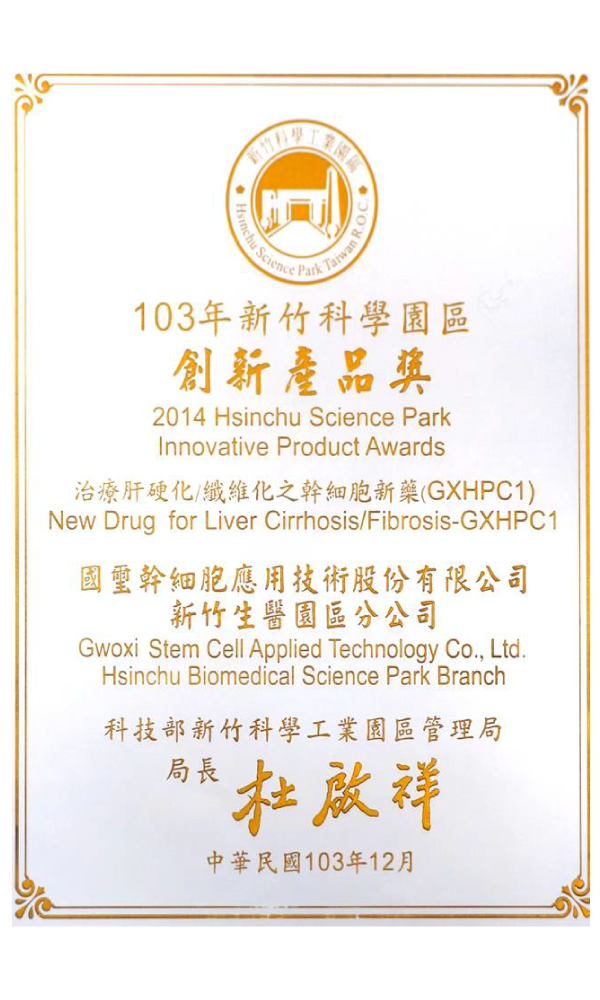 |
|||
|
2017 Taipei Biotech Awards Innovative Special Mention Award |
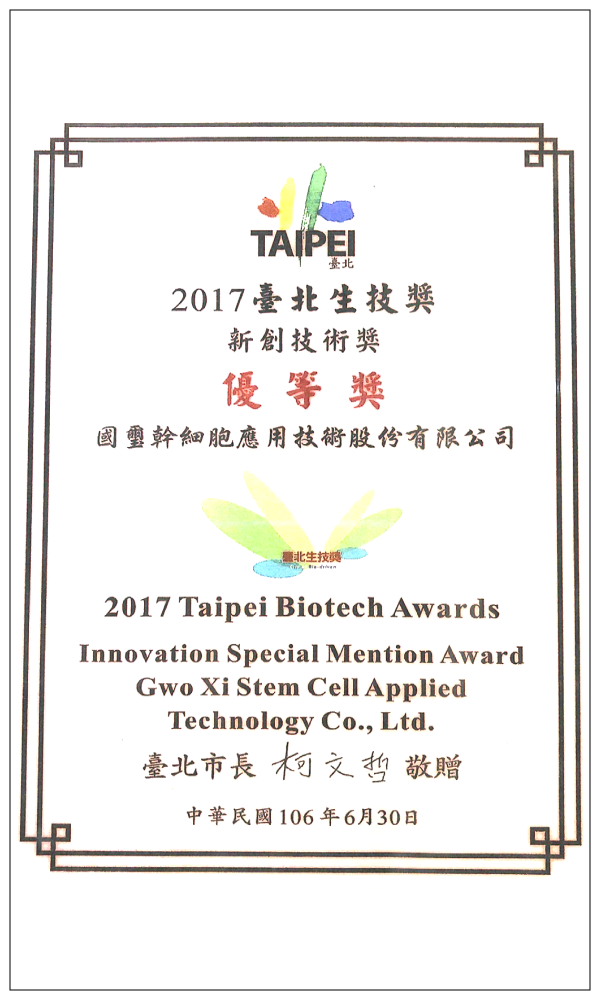 |
|||
|
2018 15th National Innovation Award |
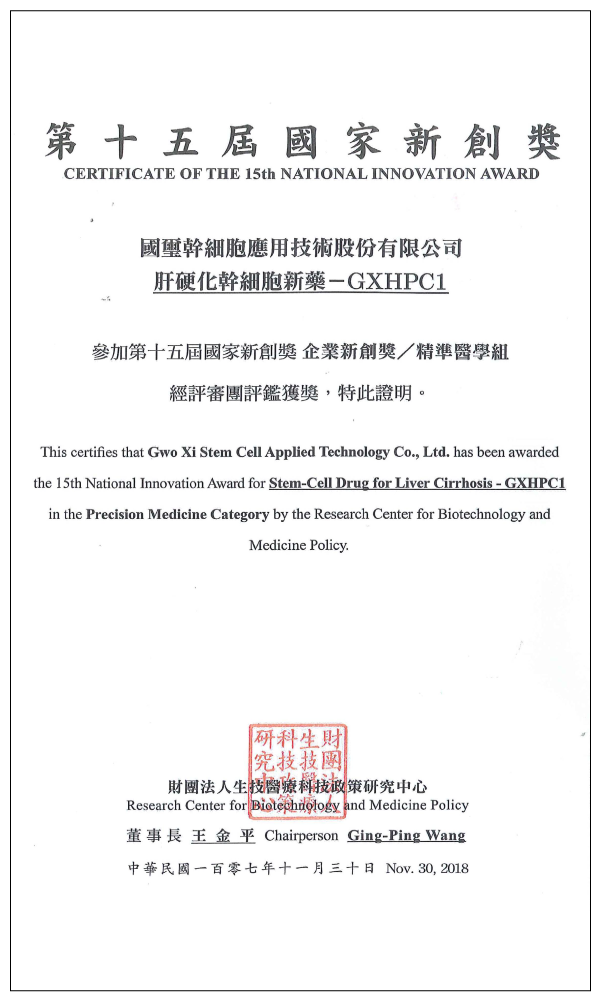 |
|||
|
2019 National Innovation Award |
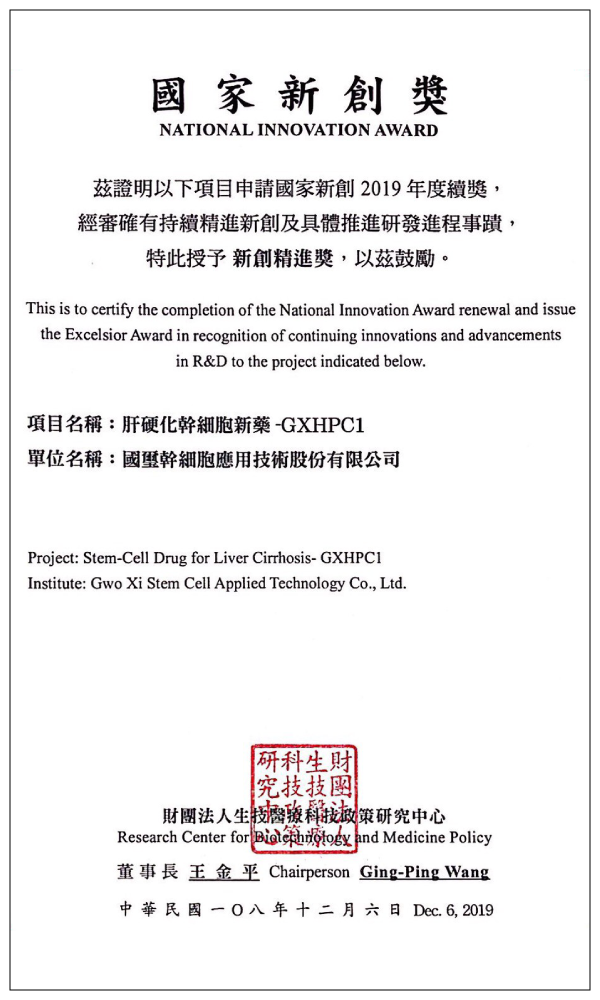 |
|||
|
2020 National Innovation Award |
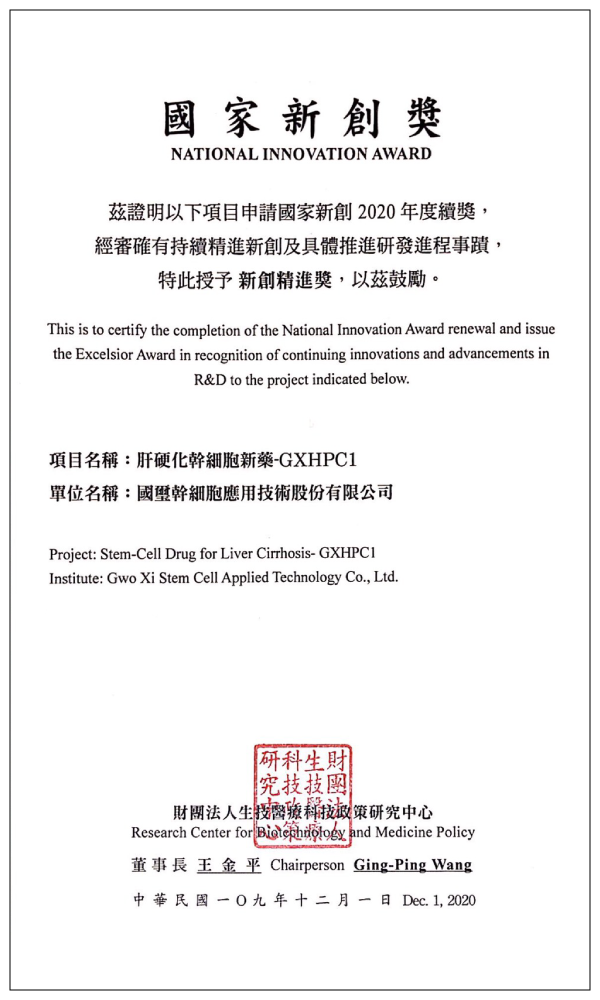 |
|||
|
2020 National Pharmaceutical Technology and Research Development Award (NPRDA) - Bronze Award. |
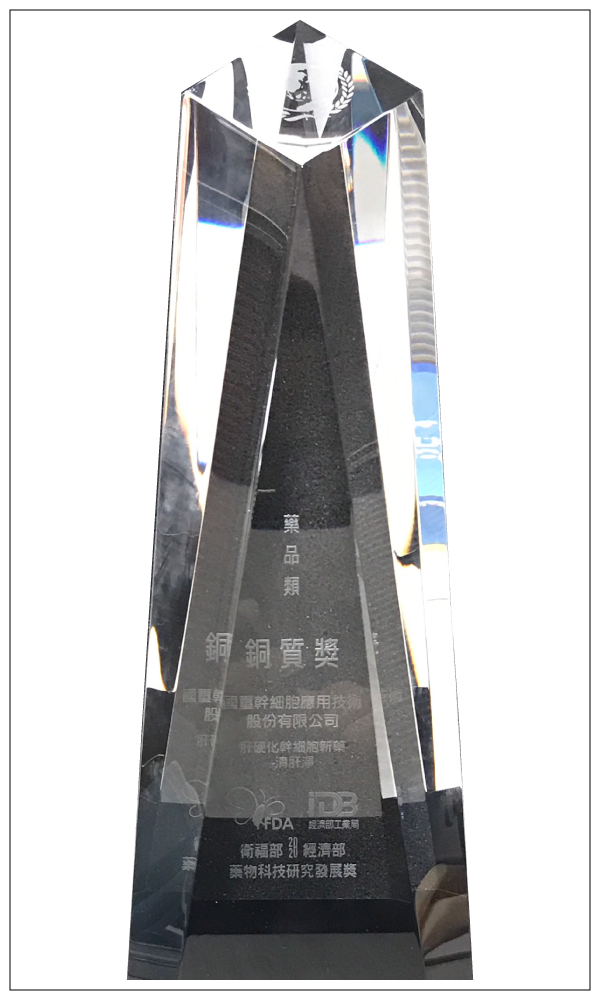 |
|||
|
2022 National Innovation Award |
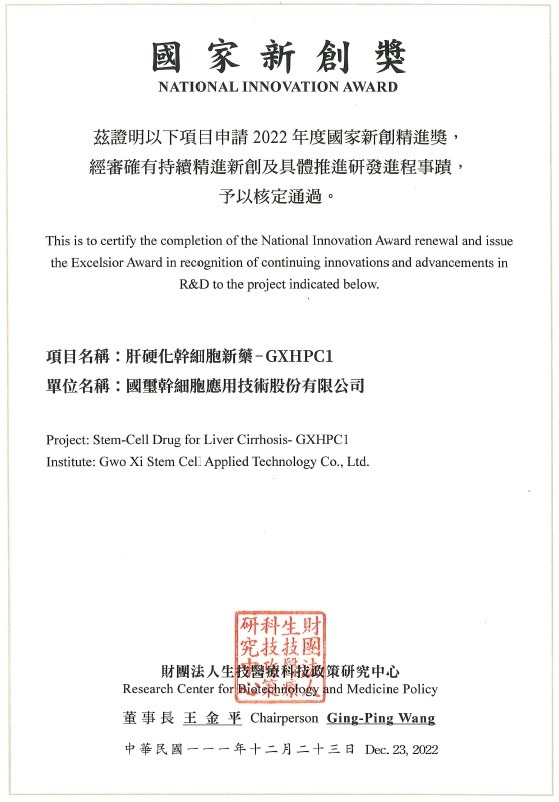 |
|||

